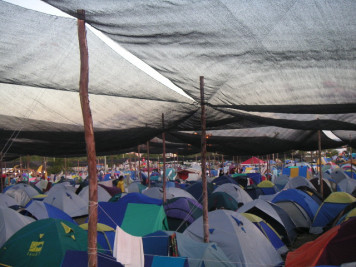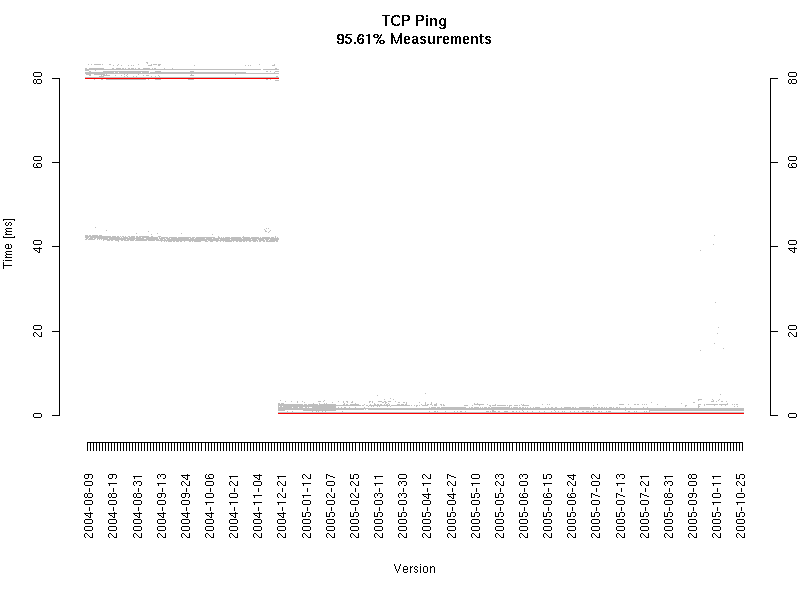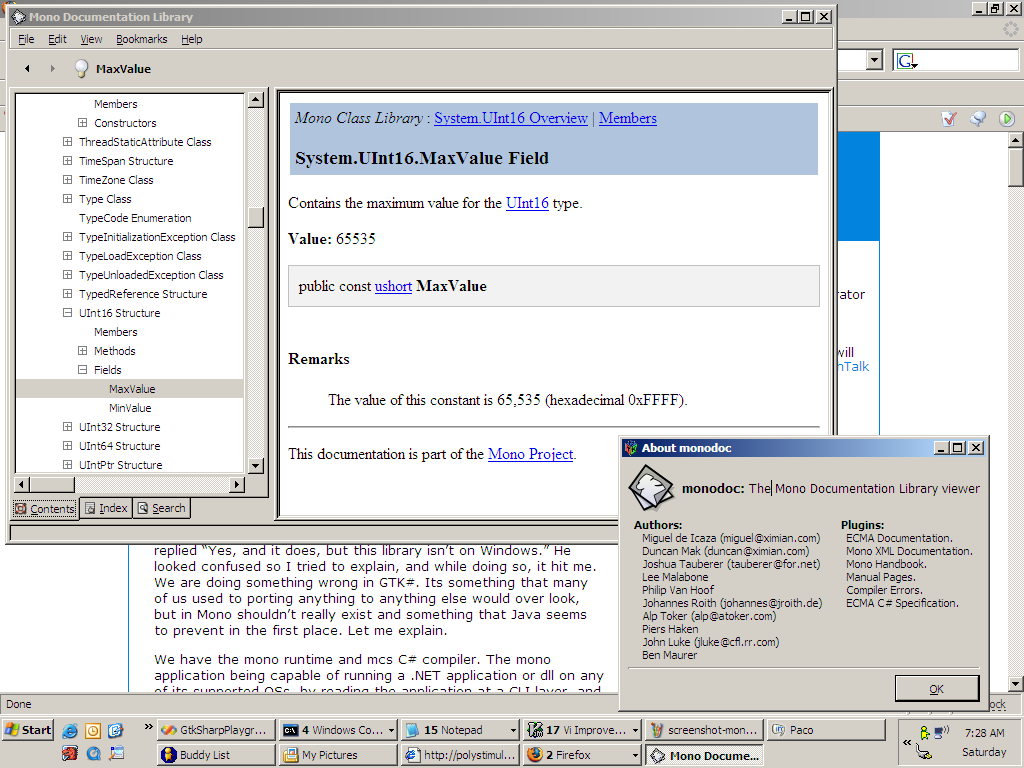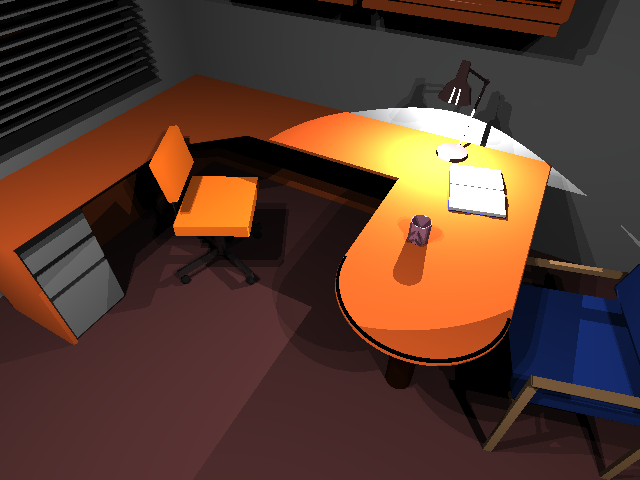Mexico
I will be in Mexico doing a talk at my old job: Instituto de Ciencias Nucleares on Friday (Feb 4th). The program is here.
Since am going to be there since Thursday, am wondering if we people are interested in a get-together to discuss Mono and Open Source the day before?
Drop me an email, and we can set something up.
Posted on 31 Jan 2005
World Social Forum
Laura is currently at the World Social Forum in Porto Alegre, Brasil:

Laura at the World Social Forum.

Youth Camping Site at the SWF.

Laura in Queretaro.

Aramis
Mono Performance Discussion
There is an interesting thread about Mono performance today. The debate centers around exception handling. For non-Monologue readers, you might want to start with the post from the Nemerle developers followed by very interesting reply from Paolo.
By the end of the day, the report from the Nemerle folks is here:
From the other news, lupus did some mambo jumbo in mono to get our testcase 4x as fast as it used to be. Impressive! If only the other implementation was as fast... I guess I can now report this as a performance issue with a nice argument in hand.
Jailed for using Lynx
Am feeling safer now: Donator to Tsunami effort jailed for using non-standard Web Brwoser.
Politics
Apparently there is another journalist paid by the administration to advance their agenda.
Darrick liked my link to the pictures of Iraq the other day pointed me to this article: What I Heard About Iraq. I liked it.
The 10 Worst Corporations of 2004. By none other than Russell Mokhiber and Robert Weissman.
Mokhiber runs my favorite Scottie and Me' column, previously known as `Ari and I'.
Posted on 28 Jan 2005
Stephen Walli is Blogging
Stephen has started a blog (you might remember him from interviews related to Microsoft's open source applications FlexWiki and WiX).
He has posted an interesting essay: When are you going to sue your customers?:
The article contains some histerical examples.
Still in Boston
I was on my route to Seattle, but my planes kept getting cancelled. Am scheduled to leave Boston tomorrow morning and arrive to Seattle at 7pm.
Iraq
An unparalleled collection of pictures from children in Iraq is here. Not the average images on mass media.
This guy has 53 days of daily pictures from Iraq (I took the previous link from here).
Another article from Robert Fisk reporting from Bagdad.
Plutocracy and Ramsey Clark
Former attorney general Ramsey Clark will be defending Hussein, some of his reasons are detailed on a note published today. I found it interesting, and also found this intereview from 1999 where he touches on Vietnam, Iraq and military spending:
If we are to significantly change our culture, we need to recognize that we are held in thrall by two desperately harmful value patterns. One is the glorification of violence. We absolutely, irrationally, insanely glorify violence. We often think that we enjoy watching the good guys kill the bad guys, but the truth is that we enjoy watching the kill itself.
The other value is materialism. We are the most materialistic people who have ever lived. We value things over children. Indeed, the way we show how much we value children is by giving them things, to the point where a mother's self-esteem depends on whether she's the first in her neighborhood to get her child some new toy.
[...]
You began this interview by asking me about U.S. foreign policy, and I said that it's been a failure. Here is the standard by which I would judge any foreign or domestic policy: has it built a healthier, happier, more loving society, both at home and abroad? The answer, in our case, is no on both counts.
[...]
We also have to realize that we're going to be here only one time, and we've got to enjoy life, however hard it is. To miss the opportunity for joy is to miss life. Any fool can be unhappy; in fact, we make whole industries out of being unhappy, because happy people generally make lousy consumers. It's interesting to see how the poor understand all of this better than the rich.
Posted on 25 Jan 2005
Beagle and Mono demos
 Nat has directed, produced and performed in a series of
videos on Beagle, the
desktop search tool for the Linux desktop that is being cooked
by those in the Gnome, Mono and Novell communities.
Nat has directed, produced and performed in a series of
videos on Beagle, the
desktop search tool for the Linux desktop that is being cooked
by those in the Gnome, Mono and Novell communities.
The videos are here. There are also a couple of Mono demos.
Beagle was originally demostrated on the 28th of June in the GUADEC conference in Norway.
Posted on 24 Jan 2005
Recent Novell Open Source Hires
 Novell just hired Niels
Bornstein, the co-author of Mono: A
Developer's Notebook. The O'Reilly best-seller. Niel
will be working on the Linux and Open Source practice group.
Novell just hired Niels
Bornstein, the co-author of Mono: A
Developer's Notebook. The O'Reilly best-seller. Niel
will be working on the Linux and Open Source practice group.
Also Tor Lilqvist, the developers who brought GIMP and Gtk+ to Windows has been hired to work full time on Gtk+ on Windows and to assist us porting various Gtk+ based applications to Windows. Nat's blog has more details.
Tor will initially be helping Frederik port our new Desktop Search tool Beagle to Windows:

Later he will take on the final step to make the world a safer place: bring Evolution (our email and calendar client) to Windows. Even Windows users deserve an email program instead of a petri dish of worms and viruses.
David Reveman one of two developers behind Glitz also joined Novell. He will be working full-time on completing and tuning Glitz as well as contributing to the Cairo imaging library (the framework that will become the foundation for most open source projects to do graphics rendering).
Glitz brings OpenGL-based acceleration to Cairo rendering (Cairo is Mono's substrate for implementing the System.Drawing namespace). Screenshots of Glitz rendering are availble here.
 And finally Robert O'Callahan has
joined the Novell desktop team to work full time on various
Mozilla improvements. Robert is working on some pretty
exciting things: Multi-column layout for web pages, improving
Mozilla's SVG support and continuing Mike Shaver's work on
MonoConnect.
And finally Robert O'Callahan has
joined the Novell desktop team to work full time on various
Mozilla improvements. Robert is working on some pretty
exciting things: Multi-column layout for web pages, improving
Mozilla's SVG support and continuing Mike Shaver's work on
MonoConnect.
Commondreams favorites
A few of my favorite articles from CommonDreams in the last few days:
- Robert Fisk: Fear and Voting in Baghdad.
- Robert Fisk: 'Hotel Journalism' Leaving Big Holes in Reporting About Iraq. Specially interesting after reading "Pity the Nation" when Robert describes the environment in which journalists were covering Israel's invasion of Lebanon from the "Commodore" hotel in Beirut never leaving the facilities to report live.
- Molly Ivins: Leading by Misleading.
- Greg Palast: CBS' Cowardice and Conflicts Behind Purge. An interesting article from investigative journalist on the scapegoats of the recent CBS fiasco.
- David Corn: WMD Hunt Ends, Bush's Spin Goes On (also related: Star Tribune Editorial
- Michael Brown: Palestinian Elections: Voting is Good. Freedom is Better.
- Noam Chomsky interview: on the solution to the Palestinian conflict.
Mono News
Tracking Performance: Tomas's team in Charles University has published the results from speed benchmarking on Mono to track potential performance regressions. On the graph you can clearly see Lluis' fix to the remoting channels (the large drop in the Tcp tests). These have caused quite a lot of excitement in the Mono team:

Following up on Zac's port of Gecko# to Windows (which is now used in the Windows Beagle port), we now have patches to run Monodoc with Gecko# instead of GtkHTML.

By Mono 1.2 I want to switch Monodoc to use Gecko, to let us use CSS instead of tables in our documentation rendering.
Mono Windows.Forms implementation is rapidly advancing, it is now capable of running Winforms NPlot, as opposed to my Gtk# port:

The Windows.Forms team has started a blog to track the major developments, it is available here.
DotRay: A ray tracer written in C# for .NET and Mono was recently announced. It will become a nice test for the performance tuning going into Mono (Mono's Arrays Bounds Check Elimination code was recently updated to eliminate some checks it was missing and the AMD64 bit port has support for the SSE instructions set, which we are going to backport to the x86 backend):

In the last couple of days people have been using Ben Maurer's Mono heap profiler:

Various improvements have been based on the tool: from System.XML memory reduction (1.5 megabytes shaved with a relatively small patch when loading a 25 megabyte file) to improvements to F-Spot memory usage.
Paolo also did some micro-tuning for P/Invoke hungry libraries; It shaved about 50k-60k of memory for Gtk# based applications on startup.
F-Spot also went through some performance tuning optimizations: Larry greatly improved the rendering speed when switching pictures and in particular when rotating photographies (F-Spot automatically rotates pictures based on the EXIF metadata of the image).
Robert Love's new Linux Kernel Book
Robert Love (here shown in his natural habitat) just got the second edition of his book "Linux Kernel Development" published. It now comes with a cute Novell cover. Get your copy today.
Companion to Pity the Nation
I keep churning through Chomsky's Fateful Triangle book (he now has a blog!)
Partly the book is a good complement to "Pity the Nation". Pity the Nation tells the story from Robert Fisk's standpoint a journalist in Beirut that covers the events on a daily basis. Chomsky's book on the other hand breaks up the various elements of the civil war by topic, so the actors and events are easier to identify in his book. Chomky's book lacks the sense of a story that Pity the Nation has though.
OH MY GOD OH MY GOD OH MY GOD OH MY GOD OH MY GOD
Keith Packard has a Blog. And I love it!
Posted on 19 Jan 2005
Mandatory Video
I like to watch this video every six months, Larry Lessig's presentation at OSCON.
A trascript is available: here
One of my favorite quotes from this presentation is this:
In an interview two days ago, Watts said, Here's the problem with Washington: "If you are explaining, you are losing." If you are explaining, you're losing. It's a bumper sticker culture. People have to get it like that, and if they don't, if it takes three seconds to make them understand, you're off their radar screen. Three seconds to understand, or you lose. This is our problem. Six years after this battle began, we're still explaining. We're still explaining and we are losing.
Floating Point
Havoc and Elijah, you might be interested in What Every Computer Scientist Should Know About Floating Point.
Love, Miguel.
Posted on 15 Jan 2005
Visiting Seattle
I will be in Seattle from the 23rd to the 28th of January. If you are in the area and would like to meet, have dinner, discuss free software, Mono, Gnome or debate interesting topics, drop me an email ([email protected]).
iPod and iTunes
Today a friend of mine asked me if I bought music from the Apple iTunes Store and whether she should. I explained to her that the music she purchases will be locked into the iPod and iTunes and she wont be able to play it on other MP3 players unless she hacks her music.
As for myself, I have been using FairKeys to copy the music to my Linux running laptop.
Today a timely article from the Register discusses some of the details.
As Cory Doctorow likes to point out about Digital Rights Management: Its not about what you can do today, its about they will allow you to do tomorrow.
Armed Spyware
Joe points to an article on spyware that exploits security holes to install itself on people's computers. An interesting read.
I have recommended my friends to use Macs or Linux in the past (If she can use Linux so can you). The only downside of Apple is that it creates a powerful distortion field.
Posted on 14 Jan 2005
Turkey
This coming March I will be at the Free Software and Open Source days in Istanbul.
Once I have traveled that far, the question is whether I should visit something else while am that far. The options are doing a technical stop in Paris, or doing more middle-eastish trips.
After reading Pity the NationI am left with a desire to visit Lebanon. Most likely I will have little time to spend in the Middle East though.
Mono Presentation in Dallas
Paco from the Mono team will be doing a presentation on January 18th at the Dallas Forth Worth .NET users group, details are here
Gnome LaunchBox
Lovely tool for starting apps in Gnome from the fine folks at Imendio: LauncBox.
Posted on 13 Jan 2005
Cecil on Mono SVN
Jb Evain check his Cecil library into the Mono SVN repository (module name `cecil').
Cecil is a library that can be used to consume and produce CIL libraries. We are planning on using it for writing a "diet" program that will act as a "garbage collector" for assemblies (Paolo has written one already with the low-level C interface), allowing developers to create arbitrary profiles of the Mono class libraries given a starting root set. This will be handy addition to our bundles
In addition to that, there are various other things that we have in mind for Cecil: writing a new verifier, writing a bug-finder, writing a CLS and style compliance tool (like FxCop) and Jb's own work on his Aspect weaver.
Posted on 10 Jan 2005
Confessions of an Economic Hit Man
I first found out about "Confessions of an Economic Hit Man" from this article on CommonDreams.
My copy of the book arrived yesterday and I have not been able to put it down. The book tells the story of a man that is trained to convince third-world countries to accept large loans for developing infrastructure. This is done by creating models and projections of the prosperity that such projects would bring to their countries.
The book tells a story of money being funneled from the World Bank loans into various corporations in the United States as well as the resulting unpayable debt that remains in the country. This debt can never be canceled and it is later exchanged by land, military bases, or favoring votes in the UN. In exchange politicians who accept these terms get a popularity boost from bringing infrastructure into the country.
The trick is to predict growth in terms of the gross national product. Even if the benefit goes to a single individual and the rest of the country is impoverished as a result.
There are three stages described in the book to ensure that a country gets the debt. The first step is to convince the country leaders of the benefits that it will bring to the population and the economic growth of the country. If the leaders refuse, then a second team referred to as "the jackals" perform targeted assassinations and if this fails, then the army is sent.
Any latin american has been a witness of these loans, the constructions and the special favors going to a few companies in the past twenty years. This book offers an insight into the inner workings of this process.
John Perkins tried to write this book four times, and four times he was convinced not to. This book is the fifth encarnation.
You always suspect something is fishy when living in Latin America, and the opposition typically blames large corporations for the sketchy deals. Sometimes the stories are so incredible that you can not believe them until you find documents like The Church Report.
Gnome Artwork and Software Piracy
Jakub points out that a company who is heavily borrowing GNOME's GPLed icons for its products and its web page has some strongs words about software piracy.
Posted on 08 Jan 2005
CommonDreams links
An interesting an succint look at administration mistakes
Gecko# working on Windows
Thanks to the work of Zac Bowling the Mozilla bindings for Mono and Gtk# (Gecko#) are now working on Windows, see screenshot here.
This is using the standard Mozilla DLLs. His code is available here
Mono updates
There are plenty of updates from the land of Mono, I will write about those later. The most important things is that the new Windows.Forms implementation has replaced the old version on our repository, and that Geoff has implemented native MacOS X support for it.
On the JIT world Zoltan has completed the work to produce Position independent code (PIC) for our ahead-of-time compiled programs which will reduce the memory usage for long-running Mono applications.
In the meantime Massi continues to improve our SSAPRE and is going to be adding elements from GVNPRE to SSAPRE which in a single pass will give us some nice performance numbers for computationally intensive tasks.
Best Book in Years
I finished reading Robert Fisk's Pity The Nation a book that recounts the last 20 years of the story of Lebanon from the point of view of a war journalist. The book is gripping and its hard to put it down. Robert Fisk weaves plenty of different stories, anecdotes and interviews to produce a detailed tale of life in Lebanond during the civil war.
I have not read fiction for a long time, partially because books like this one tell a more vivid and interesting story than fiction does.
This book goes into the living standards, the traditions and the sources of various conflicts as well as covering the mistakes that every army makes in their search for conquest or liberation.
Of particular interest was watching the news with the reports from Iraq by the time I was reading the second half of the book, as it seems that the more we live and the more documented humanity mistakes are, the less we learn from them. Those who planned the latest war would have benefitted tremendously from reading Robert's account of the Lebanese conflict as they repeated the same mistakes the large armies did twenty years ago.
Its only 12 dollars for 700 pages of stories.
Posted on 07 Jan 2005
Blog Search
Archive
- 2024
Apr Jun - 2020
Mar Aug Sep - 2018
Jan Feb Apr May Dec - 2016
Jan Feb Jul Sep - 2014
Jan Apr May Jul Aug Sep Oct Nov Dec - 2012
Feb Mar Apr Aug Sep Oct Nov - 2010
Jan Feb Mar Apr May Jun Jul Aug Sep Oct Nov Dec - 2008
Jan Feb Mar Apr May Jun Jul Aug Sep Oct Nov Dec - 2006
Jan Feb Mar Apr May Jun Jul Aug Sep Oct Nov Dec - 2004
Jan Feb Mar Apr May Jun Jul Aug Sep Oct Nov Dec - 2002
Jan Feb Mar Apr May Jun Jul Aug Sep Oct Dec
- 2022
Apr - 2019
Mar Apr - 2017
Jan Nov Dec - 2015
Jan Jul Aug Sep Oct Dec - 2013
Feb Mar Apr Jun Aug Oct - 2011
Jan Feb Mar Apr May Jun Jul Aug Sep Oct Nov Dec - 2009
Jan Feb Mar Apr May Jun Jul Aug Sep Oct Nov Dec - 2007
Jan Feb Mar Apr May Jun Jul Aug Sep Oct Nov Dec - 2005
Jan Feb Mar Apr May Jun Jul Aug Sep Oct Nov Dec - 2003
Jan Feb Mar Apr Jun Jul Aug Sep Oct Nov Dec - 2001
Apr May Jun Jul Aug Sep Oct Nov Dec